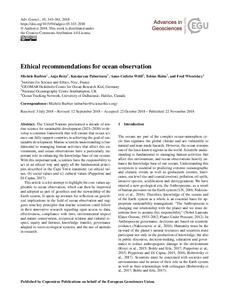| dc.contributor.author | Barbier, Michèle | |
| dc.contributor.author | Reitz, Anja | |
| dc.contributor.author | Pabortsava, Katsiaryna | |
| dc.contributor.author | Wölf, Anne-Cathrin | |
| dc.contributor.author | Hahn, Tobias | |
| dc.contributor.author | Whoriskey, Fred | |
| dc.date.accessioned | 2018-12-06T20:06:47Z | |
| dc.date.available | 2018-12-06T20:06:47Z | |
| dc.date.issued | 2018 | |
| dc.identifier.citation | Barbier, M.; Reitz, A.; Pabortsava, K.; Wölfl, A.-C.; Hahn, T.; and Whoriskey, F. (2018) Ethical recommendations for ocean observation, Advances in Geosciences, 45, pp.343-361. DOI: https://doi.org/10.5194/adgeo-45-343-2018. | en_US |
| dc.identifier.uri | http://hdl.handle.net/11329/555 | |
| dc.identifier.uri | http://dx.doi.org/10.25607/OBP-126 | |
| dc.description.abstract | The United Nations proclaimed a decade of marine
science for sustainable development (2021–2030) to develop
a common framework that will ensure that ocean science
can fully support countries in achieving the goal of sustainable
development. Marine scientific understanding is fundamental
to managing human activities that affect this environment,
and ocean observations have a particularly important
role in enhancing the knowledge base of our oceans.
With this important task, scientists have the responsibility to
act in an ethical way and apply all the fundamental principles
described in the Cape Town statement: (a) ethical values,
(b) social values and (c) cultural values (Peppoloni and
Di Capua, 2017).
This article is a first attempt to highlight the core values applicable
to ocean observation, which can then be improved
and adopted as part of geoethics and the stewardship of the
Earth system. It opens up avenues for reflection on geoethical
implications in the field of ocean observation and suggests
nine key principles that marine scientists could follow
in their innovative research regarding open access to data,
effectiveness, compliance with laws, environmental respect
and nature conservation, reciprocal relation and cultural respect,
equity and fairness, knowledge transfer, governance
adapted to socio-ecological systems, and the use of animals
in research. | en_US |
| dc.language.iso | en | en_US |
| dc.rights | Attribution 4.0 | * |
| dc.rights.uri | http://creativecommons.org/licenses/by/4.0/ | * |
| dc.subject.other | Ethics | en_US |
| dc.subject.other | Ocean observation | en_US |
| dc.title | Ethical recommendations for ocean observation. | en_US |
| dc.type | Journal Contribution | en_US |
| dc.description.refereed | Refereed | en_US |
| dc.format.pagerange | pp.343-361 | en_US |
| dc.identifier.doi | https://doi.org/10.5194/adgeo-45-343-2018 | |
| dc.subject.parameterDiscipline | Parameter Discipline::Cross-discipline | en_US |
| dc.bibliographicCitation.title | Advances in Geosciences | en_US |
| dc.bibliographicCitation.volume | 45 | en_US |
| dc.description.sdg | 14 | |
| dc.description.bptype | Best Practice | en_US |
| dc.description.bptype | Guide | en_US |
| obps.contact.contactemail | mbarbier@sciencethics.org | |
| obps.resourceurl.publisher | https://www.adv-geosci.net/45/343/2018/ | en_US |
 Repository of community practices in Ocean Research, Applications and Data/Information Management
Repository of community practices in Ocean Research, Applications and Data/Information Management

